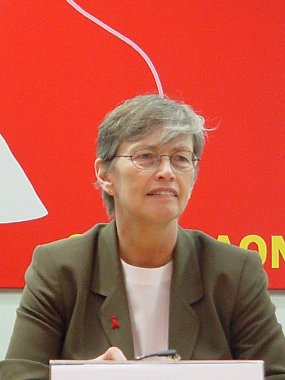
Carol Bellamy urges Arab countries to address youth issues
Arab countries urged to address youth issues - Jordan
Jordan Times - 18/05/2004
AMMAN — Young people aspiring for a better future in this region can be engines of growth or end up as a liability unless Arab governments work genuinely to incorporate this segment into the social, economic and political lives of their countries.
The statement made by UNICEF Executive Director Carol Bellamy on Monday was a wake-up call for regional leaders to grasp the opportunity of utilising their young workforce as a driving force for change.
"Unlike many other parts of the world, this region faces a youth bulge which can easily pose a challenge unless the proper investments are geared to them," Bellamy told reporters on the sidelines of the World Economic Forum.
"Here in the Kingdom, under 20s constitute more than 64 per cent of the population and close to 50 per cent are under 15 years. These are the country's future workers, consumers and participants who can serve as valuable agents for change," she added.
The UNICEF official noted that while positive strides have been taken to engage youth in life issues over recent years, such efforts continue to fall short of helping them achieve their aspirations and pacify their concerns.
The 1-2 per cent annual economic growth rate in the region over the past decade is one indicator of the need for greater investments to support youth.
According to UNICEF's 2002 national youth survey, more than three quarters of all young Jordanians believe they need to be incorporated within decision making across the board. They agreed that youth empowerment continued to lag behind despite investment and required a greater push from society.
Although young Jordanians see education as a tool for better work opportunities and acquisition of personal skills, they see little hope of a good income.
Furthermore, according to the survey, although most 10-24-year-old Jordanians saw the benefit of their current education for the future, this dropped among the 15-19 age group, with only 74 per cent of females and 81 per cent of males seeing their current education as beneficial to their future.
National surveys on a broad range of youth issues have helped paint a clearer picture of the needs and concerns of Jordanian youth today to help define national policies and allocate budgets for them.
UNICEF along with active partners in the field such as the Princess Basma Resource Centre and Save the Children has continued to invest in youth programmes that reinforce both greater national attention and resources. Jordan, however, is not alone in facing these challenges, according to Bellamy. Lebanon, Bahrain and the occupied Palestinian territories also have been gauging their own efforts in developing national youth policies and strategies with the participation of adolescents.
"Jordan has been one of the top countries placing attention on youth issues and serves as a model in the region. It should be congratulated for that," said Bellamy.
The fact that a session on youth was incorporated at a regional forum of this scope and magnitude is in itself an indicator of the attention this segment was getting, said Bellamy.
UNICEF, which operates in 158 countries, has invested in a wide range of programmes targeting children, mother care and youth welfare. Many of these programmes have evolved over the years to meet arising challenges and needs in society.
One of these includes awareness on the HIV/AIDS epidemic, which largely remains a taboo subject in the Arab world.
According to Bellamy, targeting youth for awareness on certain issues often yields the best results as young people are more prone to behavioural change.
"Talking about the subject is not easy anywhere in the world, but silence on the subject of HIV/AIDS, is the largest killer," said Bellamy.
"Education and awareness on the other hand, can be a cure."
